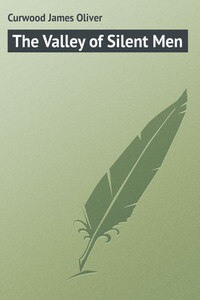Before the railroad's thin lines of steel bit their way up through the wilderness, Athabasca Landing was the picturesque threshold over which one must step who would enter into the mystery and adventure of the great white North. It is still Iskwatam– the "door" which opens to the lower reaches of the Athabasca, the Slave, and the Mackenzie. It is somewhat difficult to find on the map, yet it is there, because its history is written in more than a hundred and forty years of romance and tragedy and adventure in the lives of men, and is not easily forgotten. Over the old trail it was about a hundred and fifty miles north of Edmonton. The railroad has brought it nearer to that base of civilization, but beyond it the wilderness still howls as it has howled for a thousand years, and the waters of a continent flow north and into the Arctic Ocean. It is possible that the beautiful dream of the real-estate dealers may come true, for the most avid of all the sportsmen of the earth, the money-hunters, have come up on the bumpy railroad that sometimes lights its sleeping cars with lanterns, and with them have come typewriters, and stenographers, and the art of printing advertisements, and the Golden Rule of those who sell handfuls of earth to hopeful purchasers thousands of miles away – "Do others as they would do you." And with it, too, has come the legitimate business of barter and trade, with eyes on all that treasure of the North which lies between the Grand Rapids of the Athabasca and the edge of the polar sea. But still more beautiful than the dream of fortunes quickly made is the deep-forest superstition that the spirits of the wilderness dead move onward as steam and steel advance, and if this is so, the ghosts of a thousand Pierres and Jacquelines have risen uneasily from their graves at Athabasca Landing, hunting a new quiet farther north.
For it was Pierre and Jacqueline, Henri and Marie, Jacques and his Jeanne, whose brown hands for a hundred and forty years opened and closed this door. And those hands still master a savage world for two thousand miles north of that threshold of Athabasca Landing. South of it a wheezy engine drags up the freight that came not so many months ago by boat.
It is over this threshold that the dark eyes of Pierre and Jacqueline, Henri and Marie, Jacques and his Jeanne, look into the blue and the gray and the sometimes watery ones of a destroying civilization. And there it is that the shriek of a mad locomotive mingles with their age-old river chants; the smut of coal drifts over their forests; the phonograph screeches its reply to le violon; and Pierre and Henri and Jacques no longer find themselves the kings of the earth when they come in from far countries with their precious cargoes of furs. And they no longer swagger and tell loud-voiced adventure, or sing their wild river songs in the same old abandon, for there are streets at Athabasca Landing now, and hotels, and schools, and rules and regulations of a kind new and terrifying to the bold of the old voyageurs.
It seems only yesterday that the railroad was not there, and a great world of wilderness lay between the Landing and the upper rim of civilization. And when word first came that a steam thing was eating its way up foot by foot through forest and swamp and impassable muskeg, that word passed up and down the water-ways for two thousand miles, a colossal joke, a stupendous bit of drollery, the funniest thing that Pierre and Henri and Jacques had heard in all their lives. And when Jacques wanted to impress upon Pierre his utter disbelief of a thing, he would say:
"It will happen, m'sieu, when the steam thing comes to the Landing, when cow-beasts eat with the moose, and when our bread is found for us in yonder swamps!"
And the steam thing came, and cows grazed where moose had fed, and bread WAS gathered close to the edge of the great swamps. Thus did civilization break into Athabasca Landing.
Northward from the Landing, for two thousand miles, reached the domain of the rivermen. And the Landing, with its two hundred and twenty-seven souls before the railroad came, was the wilderness clearing-house which sat at the beginning of things. To it came from the south all the freight which must go into the north; on its flat river front were built the great scows which carried this freight to the end of the earth. It was from the Landing that the greatest of all river brigades set forth upon their long adventures, and it was back to the Landing, perhaps a year or more later, that still smaller scows and huge canoes brought as the price of exchange their cargoes of furs.
Thus for nearly a century and a half the larger craft, with their great sweeps and their wild-throated crews, had gone down the river toward the Arctic Ocean, and the smaller craft, with their still wilder crews, had come up the river toward civilization. The River, as the Landing speaks of it, is the Athabasca, with its headwaters away off in the British Columbian mountains, where Baptiste and McLeod, explorers of old, gave up their lives to find where the cradle of it lay. And it sweeps past the Landing, a slow and mighty giant, unswervingly on its way to the northern sea. With it the river brigades set forth. For Pierre and Henri and Jacques it is going from one end to the other of the earth. The Athabasca ends and is replaced by the Slave, and the Slave empties into Great Slave Lake, and from the narrow tip of that Lake the Mackenzie carries on for more than a thousand miles to the sea.









